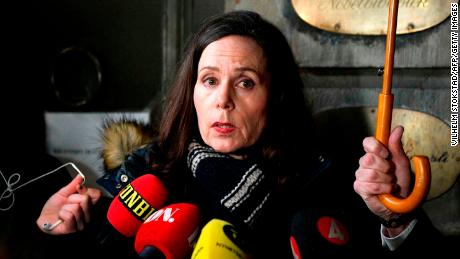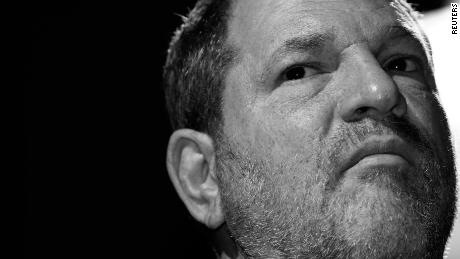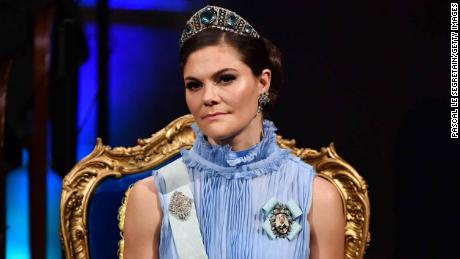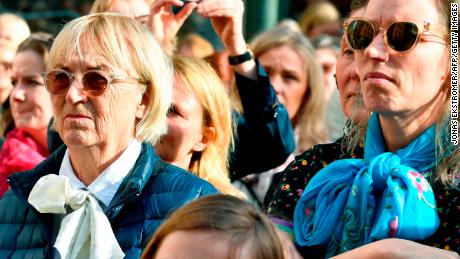This year’s prize may be delayed for first time in more than 70 years

In recent weeks, six members of the Swedish Academy — one of Sweden's most highly respected cultural bodies — have stepped down, including the head of the institution, Sara Danius. The flurry of withdrawals is potentially catastrophic for the 230-year-old academy, whose members, elected by secret ballot, must be approved by the King and traditionally hold their positions for life.With just 10 remaining active members, the group is scheduled to meet Thursday to discuss the fate of this year's literature prize, even though historically, 12 members have been required for a quorum.In 1943 — the last time the literature prize was postponed — it was the height of World War II and the Nazis ruled much of the European continent.This time, the crisis centers on Jean-Claude Arnault, a French photographer and husband of poet Katarina Frostenson, one of the six academy members to step down. Arnault, a leading cultural figure in Sweden, is facing multiple allegations of sexual assault and harassment, first reported in the Swedish newspaper Dagens Nyheter late last year. In an emailed statement to CNN, Arnault's lawyer, Bjorn Hurtig, said his client denies all the allegations.The academy is also under fire for contravening its own conflict of interest regulations by providing funding to the Kulturplats Forum, a cultural center run by Arnault and Frostenson.
'Unwanted intimacy'
The scandal, reaching to the heart of a globally respected institution and rooted in a country hailed as a model for gender equality, has sent shockwaves around the world.Last November, as the #MeToo movement gained momentum, 18 women came forward to accuse a man, later identified as Arnault, of a range of sexual misconduct between 1996 and 2017. Two of the 18, Gabriella Hakansson and Elise Karlsson, spoke on the record. CNN has not independently verified the women's claims. The following day, the academy's permanent secretary Sara Danius said that the institution had cut all ties with Arnault in light of the reported allegations and additional claims that some academy staff and members' relatives had experienced "unwanted intimacy" at the hands of Arnault. An independent investigation carried out by a Swedish law firm in the following months found that financial rules had been breached in the funding of Arnault's cultural forum and revealed that "unacceptable behaviour by (Arnault) in the form of unwanted intimacy had indeed taken place, but the knowledge was not widely spread in the Academy."
An independent investigation carried out by a Swedish law firm in the following months found that financial rules had been breached in the funding of Arnault's cultural forum and revealed that "unacceptable behaviour by (Arnault) in the form of unwanted intimacy had indeed taken place, but the knowledge was not widely spread in the Academy." But the team of lawyers also discovered that the academy had received a letter in 1996 outlining alleged sexual assault at Arnault's cultural forum, indicating that November was not the first time that at least some members of the Academy were aware that the photographer's name had been connected with misconduct. In its statement, the organization said it "deeply regrets that the letter was shelved and no measures taken to investigate the charges."Ebba Witt-Brattstroem, the former wife of Horace Engdahl, permanent secretary of the academy from 1999 to 2009 and currently a member of the Nobel Committee for Literature, has also cast doubt on the claim that its members were largely unaware of Arnault's alleged misconduct."Everyone knew and you were supposed to think nothing of it," she told CNN. She was "not at all surprised" when she read about the allegations in November. "It was very well known all over in the cultural field. People knew that young women weren't supposed to go close to him."
But the team of lawyers also discovered that the academy had received a letter in 1996 outlining alleged sexual assault at Arnault's cultural forum, indicating that November was not the first time that at least some members of the Academy were aware that the photographer's name had been connected with misconduct. In its statement, the organization said it "deeply regrets that the letter was shelved and no measures taken to investigate the charges."Ebba Witt-Brattstroem, the former wife of Horace Engdahl, permanent secretary of the academy from 1999 to 2009 and currently a member of the Nobel Committee for Literature, has also cast doubt on the claim that its members were largely unaware of Arnault's alleged misconduct."Everyone knew and you were supposed to think nothing of it," she told CNN. She was "not at all surprised" when she read about the allegations in November. "It was very well known all over in the cultural field. People knew that young women weren't supposed to go close to him."
Alleged misconduct towards Crown Princess
Witt-Brattstroem is also one of several people who allege that Arnault touched Sweden's Crown Princess Victoria inappropriately at a Swedish Academy event over a decade ago, an allegation that Arnault denies.Witt-Brattstroem told CNN that the alleged incident took place in December 2004. Members of the academy and royal family had dined together following the academy's annual public meeting and were conversing over drinks when Witt-Brattstroem claims she saw Arnault "caressing the back of the Crown Princess," who she said was standing next to her at the time. The princess' minder "was there in a second and grabbed him away," said Witt-Brattstroem.She also claims that her then husband and leader of the Swedish Academy, Horace Engdahl, was standing nearby and witnessed the incident, which Engdahl denies. In an email responding to a request for comment, Engdahl told CNN that he had "heard the anecdote, told by a member of the academy at a later date, but I was not myself witness to the situation. I'm not sure that it ever occurred or if it did, that it happened the way it has been told."Witt-Brattstroem also claims Engdahl was later asked by the royal household to ensure the Crown Princess was "never in the same room as Arnault" at the same Academy event in December 2006.Asked if that was true, Engdahl did not comment. Margareta Thorgren, spokeswoman for the Swedish Royal Court, refused to comment on any of the claims regarding the Crown Princess.The Swedish Academy did not respond to multiple requests for comment from CNN regarding the allegations against Arnault and the subsequent investigations.
In an email responding to a request for comment, Engdahl told CNN that he had "heard the anecdote, told by a member of the academy at a later date, but I was not myself witness to the situation. I'm not sure that it ever occurred or if it did, that it happened the way it has been told."Witt-Brattstroem also claims Engdahl was later asked by the royal household to ensure the Crown Princess was "never in the same room as Arnault" at the same Academy event in December 2006.Asked if that was true, Engdahl did not comment. Margareta Thorgren, spokeswoman for the Swedish Royal Court, refused to comment on any of the claims regarding the Crown Princess.The Swedish Academy did not respond to multiple requests for comment from CNN regarding the allegations against Arnault and the subsequent investigations.
'An old patriarchal institution'
The allegations are having a crippling effect on the reputation of the academy, one of Sweden's most prestigious institutions."I don't believe that it is possible to award the Nobel Prize this year," said Witt-Brattstroem. "I don't know if an author would even consider accepting a prize from this organization." On April 11, King Gustaf, whose namesake founded the Academy in 1786, intervened. "The controversy that has emerged within the Swedish Academy is very unfortunate and risks seriously damaging the important work carried out by the academy," he said in a statement.Seven days later, amidst a spiraling crisis, he announced his intention to change the academy's regulations — in place since 1786 — to allow members to resign. It is unclear when that could take effect."The Swedish Academy really is in a crisis and His Majesty is the highest protector of the Academy," Thorgren, the royal spokeswoman, told CNN. He took that step "so it was possible for the Academy to go on with the important work it does," she said.But those who have stepped down have done so for drastically different reasons, revealing deep rifts within the group. In early April, three members reportedly withdrew in protest that Frostenson, Arnault's wife, had not been removed from the institution.A week later, Frostenson stepped aside, as did Danius, the group's leader, reportedly at the request of the remaining members. A sixth member announced her withdrawal in late April, but the academy did not announce the reason. Two further members of the institution are currently inactive.
On April 11, King Gustaf, whose namesake founded the Academy in 1786, intervened. "The controversy that has emerged within the Swedish Academy is very unfortunate and risks seriously damaging the important work carried out by the academy," he said in a statement.Seven days later, amidst a spiraling crisis, he announced his intention to change the academy's regulations — in place since 1786 — to allow members to resign. It is unclear when that could take effect."The Swedish Academy really is in a crisis and His Majesty is the highest protector of the Academy," Thorgren, the royal spokeswoman, told CNN. He took that step "so it was possible for the Academy to go on with the important work it does," she said.But those who have stepped down have done so for drastically different reasons, revealing deep rifts within the group. In early April, three members reportedly withdrew in protest that Frostenson, Arnault's wife, had not been removed from the institution.A week later, Frostenson stepped aside, as did Danius, the group's leader, reportedly at the request of the remaining members. A sixth member announced her withdrawal in late April, but the academy did not announce the reason. Two further members of the institution are currently inactive. Ida Ostensson, founder and president of the Swedish equality foundation Make Equal, believes the academy needs fundamental, structural change if it is to continue its work successfully. She sees "an old patriarchal institution" that needs to be brought up to date (it has had just nine female members since its inception in 1786 — and three of those have recently stepped down, leaving just two)."To cancel the Nobel Prize or delay it — it's not enough," she said. Alongside hundreds of others, she demonstrated outside the Swedish Academy on April 19 in support of Danius, who had stepped down as permanent secretary the previous week. Ostensson believes Danius was pushed to take the blame for the Arnault scandal. "It's just one more time a woman has to leave because of a man," she said.But she's glad that the scandal has re-energized the #MeToo campaign in Sweden, a campaign whose aims Ostensson has been advocating for years, but, until last October, without the benefit of a viral hashtag.#MeToo is a powerful movement in Sweden, Ostensson explains. She recalled the first weeks after the movement's inception when thousands of women were using industry-specific hashtags to tell their stories: "Every day there was a new hashtag; everything from prostitutes to journalists, lawyers, builders, teachers.""It's not a bigger problem in Sweden (than elsewhere)," she said. "It's because we are a feminist country — that's why we can organize and speak out… Where there are women and where there are men, there are going to be problems."Witt-Brattstroem agrees. "For all women, from whores to princesses, it's the same. It really has to do with you having a female body."
Ida Ostensson, founder and president of the Swedish equality foundation Make Equal, believes the academy needs fundamental, structural change if it is to continue its work successfully. She sees "an old patriarchal institution" that needs to be brought up to date (it has had just nine female members since its inception in 1786 — and three of those have recently stepped down, leaving just two)."To cancel the Nobel Prize or delay it — it's not enough," she said. Alongside hundreds of others, she demonstrated outside the Swedish Academy on April 19 in support of Danius, who had stepped down as permanent secretary the previous week. Ostensson believes Danius was pushed to take the blame for the Arnault scandal. "It's just one more time a woman has to leave because of a man," she said.But she's glad that the scandal has re-energized the #MeToo campaign in Sweden, a campaign whose aims Ostensson has been advocating for years, but, until last October, without the benefit of a viral hashtag.#MeToo is a powerful movement in Sweden, Ostensson explains. She recalled the first weeks after the movement's inception when thousands of women were using industry-specific hashtags to tell their stories: "Every day there was a new hashtag; everything from prostitutes to journalists, lawyers, builders, teachers.""It's not a bigger problem in Sweden (than elsewhere)," she said. "It's because we are a feminist country — that's why we can organize and speak out… Where there are women and where there are men, there are going to be problems."Witt-Brattstroem agrees. "For all women, from whores to princesses, it's the same. It really has to do with you having a female body."
Original Article
[contf]
[contfnew]

CNN
[contfnewc]
[contfnewc]



